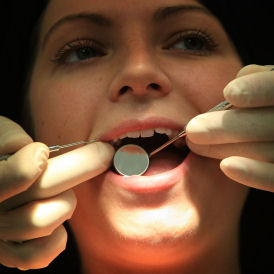It has struck fear into generations of dental patients but the whine of the high-speed drill may be about to fall silent.
Scientists at the University of Leeds claim they have discovered a pain-free treatment that allows decayed teeth to repair themselves naturally. The breakthrough would mean the end of the filling and, more importantly, drilling.
The team - a collaboration between dentists, chemists and bio-chemists - has produced a compound that temporarily fills small cavities and allows the tooth's enamel to re-grow.
"This may sound too good to be true, but we are essentially helping acid-damaged teeth to regenerate themselves. It is a totally natural non-surgical repair process and is entirely pain-free too," said Professor Jennifer Kirkham, from the University of Leeds Dental Institute, who led the research team.
Tooth decay happens when the acid environment of the mouth dissolves away the hard calcium-based enamel covering our teeth.
Enamel has no blood supply or other means of repair so tiny pores formed in enamel by early decay can quickly turn into cavities.

Only drilling and filling can prevent the entire tooth from decaying. But the new compound, called P 11-4, painlessly fills the microscopic cavities and encourages enamel to re-form.
It works by mimicking the protein scaffold around which tooth enamel naturally assembles itself as our teeth grow.
To create the cavity-repairing treatment the researchers have found a way of breaking up the component parts of the protein scaffold into its component parts – or peptides. They then engineered the peptides such that they re-assemble themselves when they are applied to the tooth.
Once applied to the cavity, the compound forms a gel into which new enamel-forming calcium is naturally deposited from the saliva in the mouth.
Fluoride, the main ingredient in toothpastes and mouthwash, helps tooth enamel to re-grow.
"This is another means, a very exciting means, of doing the same thing," said Damien Walmsley, scientific advisor for the British Dental Association. "While this is really exciting stuff it is going to take a few years to go from the test-tube to the clinic."
In a small trial of 15 patients the researchers claim to have seen "highly significant" levels of repair. In most cases, signs of decay have been reversed even months after the application of the compound.
"The results of our tests so far are extremely promising," said Professor Paul Brunton of the Leeds Dental Insitiute.
"If these results can be repeated on a larger patient group, then I have no doubt whatsoever that in two to three years' time this technique will be available for dentists to use in their daily practice."
Leeds University have licensed the technology to Swiss dental products firm Credentis AG which funded the initial trial. If larger trials can show that it works well-enough in every-day dental practice, the company plans to introduce the treatment worldwide.
The compound will only fill the pores associated with early tooth decay - not once a proper cavity has formed. That means it can prevent the need for drilling only if people visit the dentist regularly enough to spot early signs of cavities.
However, one of the main reasons people don't visit their dentists is fear. The researchers hope that by offering a pain-free solution to repairing teeth there will no longer be a reason to avoid the dentist's chair.
Source- Channel 4 news

Really very informative and creative content. This concept is a good way to enhance knowledge. Thanks For Sharing.
ReplyDeleteBest Dentist in Chandigarh
Dental Treatment in Chandigarh
Root Canal Treatment in Chandigarh
Replacement of Missing Teeth Treatment in Chandigarh
Dental Implants in Chandigarh